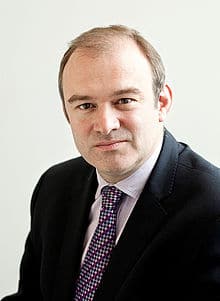Ed Davey, the secretary of state for energy and climate change, has criticised David Cameron’s Conservative party for over-hyping shale gas.
“There are those people who think it’s the silver bullet. I call them the ‘frack-baby-frackers’ – some of the Conservative party who, you know, would frack every bit of croquet lawn if they possibly could,” the Lib Dem MP said in an interview with Leo Hickman, editor of Carbon Brief, this week. “I think they’re crazy.”
He continued: “I mean, you know, they make these ridiculous ideas, not backed by any evidence, that something [fracking] will transform the British economy and massively reduce prices. No evidence for that, whatsoever.”
Just yesterday, experts warned that the role of British shale as a ‘transition fuel’ to a low-carbon economy “should not be taken for granted”.
Regulate Gas
Many have criticised Cameron for “going all out for shale”. The prime minister has previously said that fracking has “real potential to drive energy bills down” and that Britain “cannot afford to miss out” on shale gas.
According to Davey, the biggest criticism he has received over fracking is that he has not gone faster: “The biggest that I get is that I’m regulating too much. I’m very happy to have that criticism.”
While Davey admitted “I don’t know how much shale gas we’re going to get”, he argued that Britain needs gas to decarbonise rather than using imported oil and gas.
“We can regulate it a lot better than the gas we’re going to get from abroad,” he said. “So we can cut down on methane emissions and make sure health and safety and other environmental issues are dealt with more effectively.”
Risky Coal
This echoes other statements by the energy secretary recently where he said a low-carbon transition “involves a lot of oil and gas”. He added that “what we have to get after, hard and fast, is coal.”
When asked about his stance on fossil fuel divestment, Davey emphasised that companies, banks and financial institutions must be transparent. “I’m strongly in favour of greater transparency, greater disclosure and reporting requirements … I think it’s necessary for investors to have full knowledge.”
Davey didn’t advocate for immediate divestment, however, saying people should make this decision themselves by evaluating the risks. But for him, coal is the exception.
“If you look at the risks of investing in coal, that’s got to be, I would have thought, people would need to be a little more worried about investing in coal than perhaps they were 10 years ago,” he said.
The Power of Solar
Davey also stressed the need to invest in renewable energy: “The risk of climate change happening is so severe, the risk of it being disastrous for the UK and elsewhere is so severe, that it is absolutely reckless to take any low-carbon technology off the table at the moment.”
Given the choice to invest £1,000 in fracking, solar energy or onshore windfarms Davey chose solar. “I have been really, really impressed by how solar costs are coming down, and that’s good for the UK, but, boy, is it good for the poorest in our world, in Africa and Asia.
“These people will be able to use solar as their lowest form of electricity ever. This will unlock human development, for hundreds of millions, if not billions of people. And they will be able to play their part in the world, but in a low-carbon way. That’s so exciting.”
Photo: Wikipedia via Creative Commons
Subscribe to our newsletter
Stay up to date with DeSmog news and alerts







